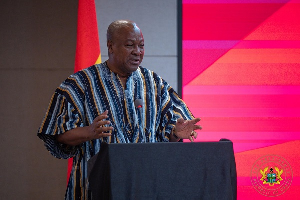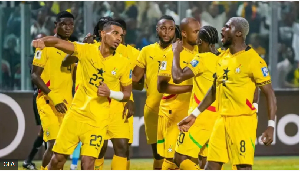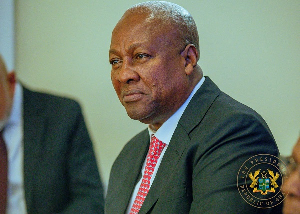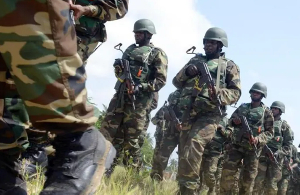,,,,at the Basic and Secondary Levels - Who Solves Them?
There is an increasing realisation all over the world that only through the right type of education can human beings be made good citizens, and for that matter, a better order of society be built. Every now and then, the country’s leaders, including educationists of various hues and disciplines, talk of the deficiencies of the present educational system, and plead for reforms. No wonder, there has been a plethora of education reform committees and commissions, including a considerable experimentation in the processes of education in Ghana. However, the basic problem of fitting the system to the real needs of the country and its people has remained unsolved.
Is Ghana therefore becoming a failed state in spite of the abundance of natural resources and human capital? If not so, why has it taken our leaders so much time to solve basic educational problem? Is it because none of their kids becomes a victim of the educational mess?
It is no gainsaying the fact that successive governments, over the years, have committed financial resources and put up numerous interventions with the view to addressing the challenges confronting basic and secondary education, but what is the state of education in Ghana today? At the basic education level, for instance, evidence from the media recently revealed that 64% of pupils at the basic level cannot read and write. Besides, a press release by the Ghana Education Service (GES) in September 2012 showed that Ghana has a 60,000 teacher deficit at the basic level with over 80,000 as pupil teachers filling the classrooms. It therefore beggars belief that the same GES would place a ban on teacher recruitment, including those for re-engagement this year.
Whilst the 38 public Colleges of Education have the capacity to produce only 9,000 Diploma teachers on annual basis, an average of 18,000 practicing teachers apply for study leave annually though only 5,000 of such applications are authorised by the GES. Again, it is estimated that at least 20% of the 9,000 teachers who come out from the colleges of education fail to take up their appointments because educational institutions face a stiff competition from the private sector. This is due to poor remuneration and conditions of service for teachers.
On assumption of political power in 2009, the National Democratic Congress (NDC) also stated that over 4,000 pupils still study under trees in Ghana. As to how many of such trees have been eliminated with better structures, we are yet to find out from the Mahama government. Class sizes, no doubt, are still large with an average of 50 pupils per class and this is attributable to inadequate classrooms and teachers. So, here again, why this ban on teacher recruitment by the Director-General of GES? I think Ms. Naana Biney should come out to explain her action.
Seriously, with over 80% of basic schools without access to the internet, one would assume that ICT should not be an examinable subject for all pupils, but surprisingly that is not the case. Whilst in-service training for teachers is not forthcoming due to financial constraints, instructional hours are frequently misused by our teachers because proper supervision is negligible. As to what role the circuit supervisors play in the country's educational system, they are the best people to answer.
The above notwithstanding, teacher demonstrations and strike actions have become our educational "daily bread", because of poor conditions of service and remuneration. And with the introduction of the single spine salary structure, it was expected that teacher agitations and spraying of hot water on our noble teachers would be a thing of the past. However, the Ghanaian teacher is still upset because his salary is far below that of the police officer whose training lasted for only 6 months. What is more shocking is that, there are thousands of newly trained teachers and newly-recruited non-professional teachers whose salaries have not been paid for more than 12 months. Where on earth would this ever happen apart from Ghana?
Nor is this all, for, the least said about the educational curriculum, the better. Ghana's educational system is geared towards the training of the cognitive domain of the child (too scholastic/academic). Unfortunately, no attempt has been made to fashion out a curriculum to tap every child's talent as enshrined in Gardner's Theory on Multiple Intelligences. It is also apparent that most teachers do not vary their teaching methods and as a result teaching and learning have been centred on the teacher at the expense of the learner. Again, too much emphasis has been placed on examinations instead of skill acquisition. With the curriculum being overloaded with nine (9) subjects, it would be only ideal that relevant textbooks would be forthcoming but this is not the case in our basic schools. For so many years, little attention has been given to science, technical and vocational subjects, because specialised teachers in these subject areas are not adequate. Why should the government introduce a quota system in the Colleges of Education to limit student intake?
It is also a common knowledge that parental control at home is absent and most families find it difficult to provide the educational needs of their wards due to high poverty levels. This sometimes leads to teenage pregnancy as some of these innocent young girls fall prey to unscrupulous men. There is still gender inequality and the concept of inclusive education is completely missing. The pupils themselves do not take their studies seriously because guidance and counseling at the basic level is non-existent. The Parent-Teacher Associations (PTAs) and School Management Committees (SMCs) have turned into revenue collection agents, exploiting parents instead of providing effective collaboration or partnerships with schools to improve academic standards. I know of a man who has been the PTA Chairman for more than a decade, although he has no child in that particular school.
The situation at the secondary level is not different at all. For example, inadequate teacher accommodation, science laboratories, computer and Internet facilities, and more importantly irregular release of government subventions to headmasters are affecting the smooth running of these schools. On availability of teachers, the completion of the two batches (SHS 3 and 4) this academic year has brought the teacher:student ratio under control. It is my hope that these heads would admit enough junior high school graduates in the 2013/14 academic year to fill the vacuum created by SHS graduates.
For every living soul, "ghost" is not a welcome name, to the GES and some head teachers in particular, it is their source of inspiration. Several names have been intentionally inserted in the government payroll to enable such undeserving persons withdraw salaries from their accounts even though they are not practising teachers. Some of these names are teachers who have vacated their posts for several months and years, but their heads have refused to submit such names to the GES and Controller and Account-General' offices for deletion. They thus collaborate with the absentee teachers and dupe the nation of substantial amount of money. Why are we so corrupt and unpatriotic? As a solution, the GES has introduced the biometric registration of all teachers, nonetheless, the problem has not been adequately addressed as expected.
Fellow Ghanaians, it is said that education like health, sports, energy, and agriculture should be decoupled from partisan politics, but how well has this important message gone down with the NDC government under John Mahama? Since 2009, they have only paid lip-service to the problems enumerated above. Distributing drinking cups and free uniforms to a few primary school kids, re- painting of dilapidated school buildings as a way of removing schools under trees, scrapping teacher trainee allowances, and reverting SHS duration from 4 to 3 years cannot be a panacea to our educational problems. We need strategic policies from the government to address these problems since they pose a major threat to the nation's future. Over to you, Prof. Naana Opoku-Agyemang and your Education ministry!
God bless Ghana! God bless Kufuor!!
Katakyie Kwame Opoku Agyemang, Asante Bekwai-Asakyiri
(Free SHS Ambassador) Official blog: (www.katakyie.com) katakyienpp@yahoo.co.uk 0202471070 : 0264931361 : 0547851100
Opinions of Friday, 13 September 2013
Columnist: Agyemang, Katakyie Kwame Opoku














